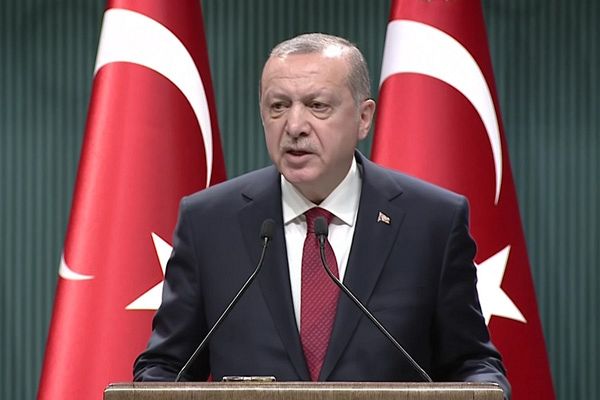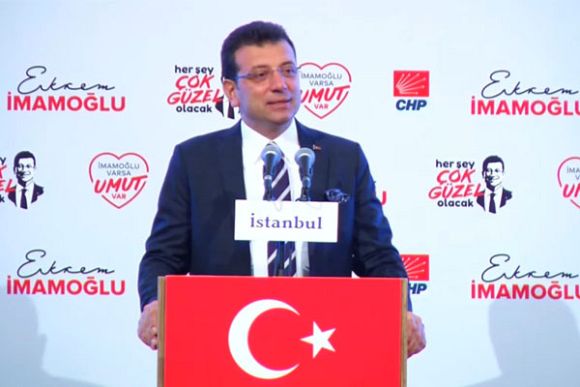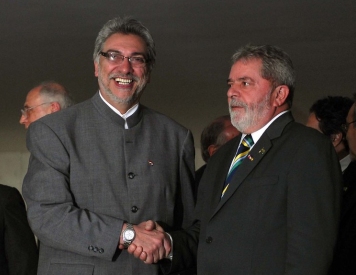As the Kobani trials move forward, political and economic tensions are increasing within the government of President Erdogan, writes Yanis Iqbal.
ON 20 MAY 2021, gaoled Kurdish politician Gültan Kışanak criticised Turkish prosecutors, warning of “a political coup” as she defended herself in an Ankara courtroom. All this happened as part of the Kobani case — the biggest political trial in modern Turkish history, with 108 leading People’s Democratic Party (HDP) officials and parliamentarians facing multiple life sentences as a 3,350-page case file indicts them on 38 counts of homicide.
They are blamed for the deaths of 37 protesters who were killed by Turkish security services and government-affiliated paramilitaries after the HDP called for street protests following President Recep Tayyip Erdogan’s inaction during the October 2014 siege of Kobani in northern Syria.
On 18 May 2021, former HDP co-chair Selahattin Demirtas accused President Erdogan and his ruling Justice and Development Party (AKP) of “sitting in the seats of the judges” as the Kobani case reopened:
At a time when politics has become so dirty and corrupt, and immorality became apparent, I want to state that me and my friends who are on trial here today are prosecuted for political reasons.
[This was] a political case, a revenge case against the HDP.
Everyone must be sure about it, we will not be in the defendant chair. Don’t worry, people of Turkey. The wind will turn.
The Grand Chamber of the European Court of Human Rights (ECHR) has found no evidence to sustain the charge against the HDP members. Reviewing the case in December 2020, the ECHR observed that the tweets used by HDP members to show solidarity with the people of Kobani “remained within the limits of political speech, in so far as they cannot be construed as a call for violence” and called for the immediate release of HDP co-chair Selahattin Demirtaş. However, the administration has insensitively continued this persecution campaign without any regard for legal procedures. What is the reason behind these actions?
HDP
When Turkey’s generals returned the country to civilian rule in 1983 after three years of military rule, the socialist movement had been crippled. A new constitution imposed a 10% threshold for parliament that was meant to exclude dissidents from the political system. Under these conditions, the Turkish Left proved incapable of influencing the post-dictatorship trajectory in any meaningful way. During the late '80s and early '90s, the main vehicle for progressive voters was the centre-left Social Democratic Populist Party (SHP), which won nearly 25% of the vote in 1987 and 20% four years later.
But the SHP was unable to develop a potent left-wing programme that could challenge the structural dominance of Turkey’s dominant conservative parties. After 1991, it was absorbed into a coalition government headed by Süleyman Demirel’s centre-right True Path Party (TPP), and by the mid-'90s had merged with the Kemalist Republican People’s Party (CHP). A number of smaller groups were also active during the 1990s and 2000s, but their efforts did not result in any notable success. The lacklustre nature of the Left ultimately contributed to the rise of the AKP.
In the parliamentary elections of June 2015, the AKP was unable to win the decisive victory Erdogan needed to revise the Constitution. His path was blocked by the HDP, which won 80 seats in the Parliament with 13% of the vote — a historic achievement for the Left in face of the authoritarian-militaristic structures that Erdoganism had instituted. The HDP is not purely a Kurdish party, although that is how it is often described in the media. It was formed in 2012 when a group of left-leaning political organisations – all with firm pro-Kurdish views – declared to form an electoral coalition. The HDP holds fairly conventional leftist positions — against nuclear power, for LGBT rights, against discrimination of minorities, for women’s equality, against neoliberalism, for worker’s power.
The AKP response to the June 2015 election was the blatant deployment of criminal violence. Within weeks of the election, a bomb attack claimed by Islamic State of Iraq and the Levant (ISIL) – befriended by Erdogan in his anti-Assad operations in Syria – in the southern town of Suruç targeted radical students preparing an aid convoy to deliver toys and books to Rojava, killing 33 people. Two months later, a HDP peace rally in Ankara was bombed, killing over 100.
A reprisal by the Kurdish Workers’ Party (PKK) gave the regime the excuse to re-open counter-insurgency operations in the Kurdish regions. In the onslaught that followed, thousands of people lost their lives, including hundreds of civilians. More than 10,000 homes were destroyed, tens of thousands of residents were displaced and towns were left economically crippled. Mobs torched and vandalised the party buildings of Kemalists, leftists and Kurds. They were primarily organised by the AKP’s Ottoman Hearths and the fascist National Action Party (MHP) militias that murdered thousands of leftists and Alevis in the late 1970s.
In November 2015, Erdogan called a second election in coalition with the MHP. The MHP combines Pan-Turkic ethnonationalism with rabid anti-communism, lethally practised by its youth organisation, the Grey Wolves. The party also has deep links with organised crime. Conservative nationalists rallied to give the AKP 50% of the vote and – due to the Turkish electoral roles – 58% of the parliamentary seats. With its mandate renewed, the Erdogan regime continued the work of decimating the left-Kurdish alliance: dozens of HDP parliamentarians and mayors were imprisoned in 2016 and municipalities under HDP control were barred from effective operation.
Attacks against HDP have continued to this day. On 17 March 2021, the Turkish Parliament stripped HDP lawmaker Ömer Faruk Gergerlioğlu, a medical doctor, of immunity from prosecution and revoked his parliamentary status as he was charged with “propaganda for a terrorist organisation”. All he had done was retweet news reports in 2016 that called upon the state and the outlawed PKK to reach a peace agreement.
A few hours later, it became known that one of the top state attorneys had initiated a Constitutional Court case demanding the dissolution of the HDP and a move to ban 687 of its leading political figures. This was due to its alleged close ties with the PKK and failure to take a clear stance on “national issues”. Gergerlioğlu responded resolutely to the arbitrary acts of the ruling dispensation. He said that he had been elected by the people of Kocaeli, east of Istanbul, and he would follow only their will. Gergerlioğlu moved into the HDP offices inside Parliament, where he slept until 21 March 2021 when the police entered the building and arrested him on his way to the morning prayers.
Economic woes
The repression of HDP is closely interrelated to the economic woes being experienced by the AKP Government. On 25 May 2021, Erdogan fired Oguzhan Ozbas, one of the deputy governors at the country’s central bank, the third senior official to be dismissed in two months. The lira slumped 1.2% against the dollar on the same day, bringing the currency’s losses to almost 15% since March 2021 amid fears the bank under new leadership would keep monetary policy tight to fight inflation.
According to Umit Akcay, the recent economic upheavals in Turkey have been following a definite pattern: the Government takes steps to lower interest rates and promote growth, thereby creating higher inflation and currency devaluations, which Erdogan tries to resolve through austerity. This cycle has created an atmosphere of political instability whose effects can only be contained through a wide-ranging attack on opposition groups like HDP. The economic impasse in which the AKP Government has been caught is embedded in a structural conflict at the heart of the current hegemonic bloc.
On the one hand, Turkey’s bourgeoisie, which is integrated with the global financial system, demands an orthodox monetary policy and the implementation of austerity measures. These interests are complemented by a model of subordinate financialisation which requires higher interest rates to attract investment and drive domestic growth. On the other hand, a sizeable portion of Erdogan’s electoral base – small and medium-sized enterprises (SMEs), the construction sector, Islamic capital groups that depend on state contracts and the domestic credit markets – will be hurt by higher interest rates. These groups are therefore demanding the continuation of cheap loans and a strong lira.
In the foreseeable future, tensions within Erdogan’s camp will keep increasing. Rapidly intensifying austerity measures will alienate the masses from the Government, giving the leftist forces a strong opportunity to widen their ideological network and percolate steadily into popular consciousness. Decreasing control over the political arena, in turn, will lead to a tightening of repressive tactics against the opposition. This ever-worsening nexus of neoliberalism and fascism is bound to severely dent and possibly defeat Erdogan’s noxious framework of pro-capitalist, authoritarian governance.
Yanis Iqbal is an independent researcher and freelance writer based in Aligarh, India.
Related Articles
- Beach or ashtray: How cigarettes are destroying nature
- Istanbul election a final test for Turkish democracy
- Does Turkey's downing of a Russian warplane portend deeper disaster to come?
 This work is licensed under a Creative Commons Attribution-NonCommercial-NoDerivs 3.0 Australia License
This work is licensed under a Creative Commons Attribution-NonCommercial-NoDerivs 3.0 Australia License
Support independent journalism Subscribe to IA.














